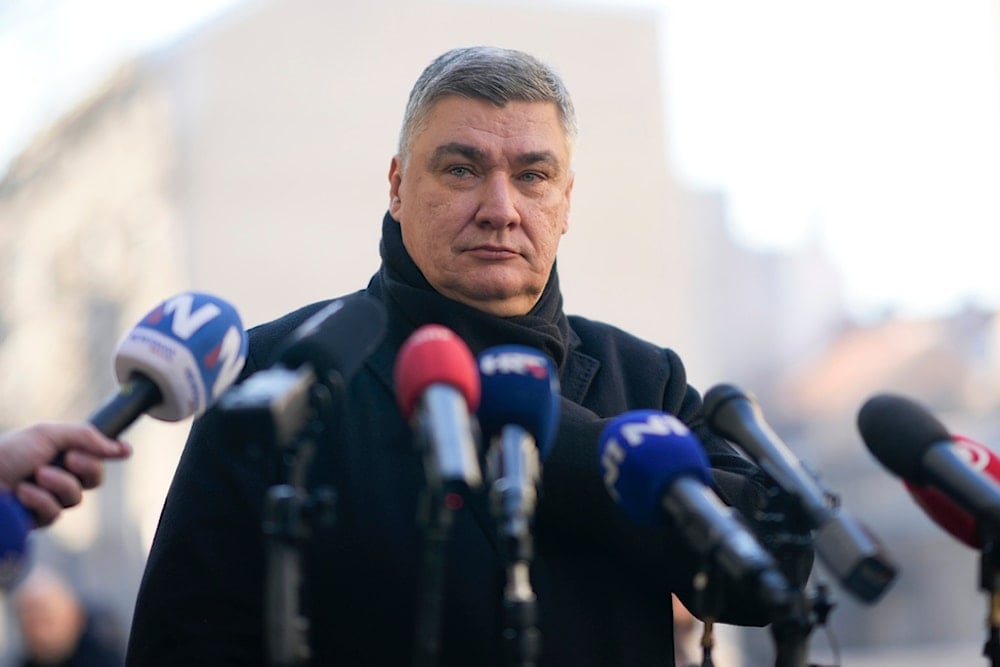Milanovic secures apparent first-round victory in Croatian election
The election took place as Croatia, an EU and NATO member with a population of 3.8 million, grapples with significant challenges, including inflation, corruption, and a labor shortage.
-

Croatia's President Zoran Milanovic speaks to the media after casting his ballot during presidential elections, at a polling station in Zagreb, Croatia, on Sunday, December 29, 2024. (AP)
Croatian President Zoran Milanovic appears to have won re-election in the first round, according to exit polls released on Sunday. Backed by the opposition Social Democrats, Milanovic garnered 51.48% of the vote, surpassing the 50% threshold needed to avoid a runoff. His nearest competitor, Dragan Primorac of the ruling HDZ party, secured 19.29% of the vote, according to figures reported by state-run HRT television.
Croatia, presidential election (first round) today:
— Europe Elects (@EuropeElects) December 29, 2024
Ipsos exit poll shows that the incumbent Zoran Milanović (*-S&D) is set to win a majority of the votes.
If the State Electoral Commission (DIP) confirms this result as final, Milanović has won the presidential election in the… pic.twitter.com/befR3UNauE
The election took place as Croatia, an EU and NATO member with a population of 3.8 million, grapples with significant challenges, including inflation, corruption, and a labor shortage. While Milanovic was widely seen as the favorite, pre-election surveys had suggested that no candidate would achieve the outright majority required to win in the first round. If confirmed, Milanovic's victory would represent a significant blow to Prime Minister Andrej Plenkovic and his HDZ party, which has dominated Croatian politics since independence in 1991.
Among the eight presidential candidates, two women—Marija Selak Raspudic, a center-right MP, and Ivana Kekin, representing the green-left—each received around 8% of the vote, according to the exit poll.
Balance of power and leadership style
The Croatian presidency, while limited in scope, includes authority over the armed forces and influence on foreign policy. Many voters see the office as vital to maintaining a balance of power in a political system largely controlled by the HDZ.
Milanovic, a former prime minister, has long been a prominent figure in Croatian politics. Known for his sharp wit, he has often used the presidency to challenge his opponents and criticize EU officials, sometimes adopting offensive and populist rhetoric.
Read more: Croatia leader slams West talk about tearing Russia apart as madness
While condemning Russia's operations in Ukraine, Milanovic has been outspoken in opposing Western military aid to Kiev. This stance led Prime Minister Plenkovic to accuse him of being pro-Russian and undermining Croatia's credibility in NATO and the EU. Milanovic defended his position, stating, "As long as I'm president no Croatian soldier will wage somebody else's wars."
A polarized political landscape
The election also reflects an ongoing rivalry between Milanovic and Plenkovic, with corruption and governance at the forefront of the campaign. Milanovic has frequently criticized Plenkovic, calling him a "serious threat to Croatia's democracy" and declaring during the campaign, "I'm a guarantee of the control of the octopus of corruption... headed by Andrej Plenkovic."
Primorac, a physician and scientist, ran as a "unifier," emphasizing family values and patriotism. "Croatia needs unity, global positioning, and a peaceful life," he said after voting in Zagreb. However, his campaign struggled to overcome Milanovic's popularity and direct criticisms of HDZ governance.
Turnout was reported at 36% by mid-afternoon, slightly lower than the 39% recorded in the previous election. Official results are expected later Sunday and, if confirmed, will solidify Milanovic's hold on the presidency, reaffirming his role as a counterbalance in Croatia's deeply polarized political environment.
Read more: US, NATO in proxy war against Russia in Ukraine: Croatian President

 3 Min Read
3 Min Read








